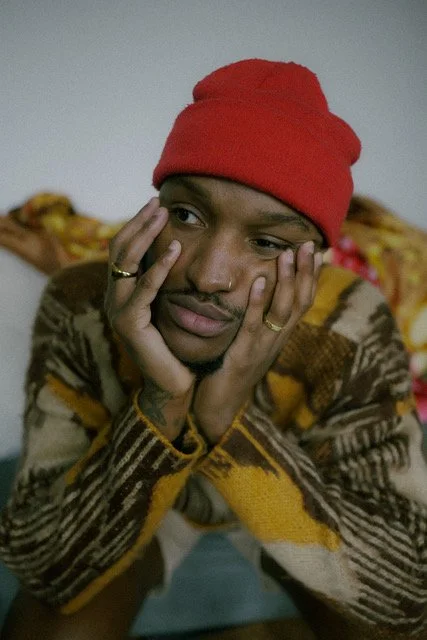Written by: Oliver Heffron
Femi Tahiru makes music that glides under your skin. The Northampton native has been separating himself from other new faces in the UK scene with his distinct style of alternative R&B, mixing soulful vocals, dusty lofi drums, and saturated guitars into one ethereal blend. While retaining the ethos of the musical world surrounding him in England, Tahiru’s shimmering instrumentation shines golden rays of West Coast soul into the mix. His brand new track “Comfortable” embodies Femi Tahiru’s exciting sound, delivering a range of vocal melodies with intriguing lyrics over a punchy beat and lush bed of filtered guitars. Coming on the heels of the colorful “Jussai” released earlier this year, Tahiru keeps honing in the best parts of his sound with each release.
Having built an impressive discography–including the viral bedroom-pop anthem “Signs” with over 2.4 M streams to date, as well as his EP Obsidian which received critical praise from UK tastemakers like BBC R1 Xtra’s Jams Supernova and BBC 6 Music’s Tom Robinson–Femi Tahiru is quickly making himself a name for himself as curator of cross-over, alt-r&b hits.
Femi Tahiru sat down with Nuance for a virtual interview to share how he got into music, created his sound, and where he plans to take it in the future:
Photo Courtesy of Ross Hook
Growing up in Northampton, a town in England’s East Midlands, Femi Tahiru grew up playing around with the guitar but primarily drawing, wanting to get into visual arts until he heard a mixtape that inspired a career change:
“I started making beats when I was 18 and that was after hearing Tom Misch’s Beat Tape 2, and I was like, ‘Yo, this is sick. I want to be able to do this.’ So I had a shitty computer at home–it was an HP all-in-on– and I downloaded fruity loops on that and then literally from there, like I just kept getting on it. Ended up Saving up enough to buy a MacBook and bought Logic Pro, and since then, I’ve just been on it.”
Besides the UK Producer Tom Misch, Tahiru was also heavily influenced by the West Coast vintage soul movement spearheaded by Tyler, the Creator, The Internet, and especially Steve Lacy. Having listened to Steve Lacy’s Demo Tapes, remembering “I used to rinse that 24/7,” Tahiru released his own demo tape last year, D.E.M.O.S., a 5-track display of his promising songwriting and producing talents. Femi describes how that West Coast sound inspired his take on the sound:
“So it was all sorts of these–I wouldn’t say that bedroom producers–but they’ve all got a distinct sound. I wouldn’t even say Lo Fi– all I can say is that it’s like quite taped, quite saturated…and I feel like I was just sort of drawn to that sort of vintage soul sort of style. That definitely helped develop my sound. Going into more recent years, I’ve been listening to a lot of older music as well from the 70s and stuff. And so yeah, like it’s, it’s, I could say that it’s definitely shaped the way I listen and hear music.”
After realizing he wanted to take a career in music seriously, Femi Tahiru enrolled in the British Institute of Music at Manchester to study the craft. He remembers the environment around the college encouraging his commitment to craft a career through the beats and melodies on his laptop:
“I think through being in an environment where there were a lot of producers, artists, guitarists… It kinda made me realize that I can’t just be here for the university experience, so I’d spend literally all of my free time just making music. I feel like I was so heavily influenced by the people around me, and not in terms of the music tastes, but just wanting to do well. So I thought, what better way to start my career than releasing music. I didn’t have a plan or anything. I just thought I’ll keep making stuff until I find one song that I really like that I released and then, without sounding big headed, each time I released songs it got better and better. And I haven’t looked back since, man.”
Around the end of his first year at the school, Tahiru was asked to perform at a student showcase. Performing for the first time to a crowd of his artistic peers, the warm reception at the showcase made him realize he’d discovered a passion: “I was the last person to perform, and everyone really liked it. That was the first time I realized performing is something I love to do.”
Since that showcase, Femi Tahiru has been steadily making a name for himself in the Northwest, regularly playing at respected venues like Gorilla and Band On The Wall while also selling out his London headline show at Paper Dress Vintage.
Photo Courtesy of Ross Hook
While his notoriety has grown, Tahiru has been sticking to the core ingredients of his sound: soulful melodies, thoughtful lyricism, and sun-soaked guitars taped together with lofi percussion and bedroom-pop intimacy. Describing how the recent track “Jussai” came together, Tahiru expresses how the free-flowing, intuitive nature of his production process shows up in the breezy feel of his music:
“I was at the studio and I was ready to leave because I couldn’t get anything down…but I think because I was ready to leave, I didn’t have any preconceived notion how I wanted things to sound, so everything just flowed so nicely. I came up with the guitar chords and then the baseline came out straightaway. Then I heard the melody and then I just wrote from there and that literally probably only took like, maybe a day, a day or two after getting the beat down.”
Contrasting the summery feel of the beat, “Jussai” lyrically depicts two lovers realizing that they just aren’t feeling eachother anymore: “I wanted to envision myself in a situation where myself and this other person just aren’t feeling the situation we’re in at all. But none of us are grown enough to say how it is. So it’s like, you need to tell me you’re not in love so we can get get the fuck out.”
While Femi Tahiru’s discography is already filled with unique gems like “Jussai” and “Comfortable,” his laptop has been stacking up much more than he’s had the chance to release.
“I’ve made a lot of music. Now, it’s just timing really and preparing for those releases, but I’ve got some good I’ve got some nice things coming, man.”


